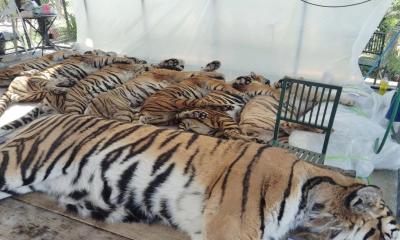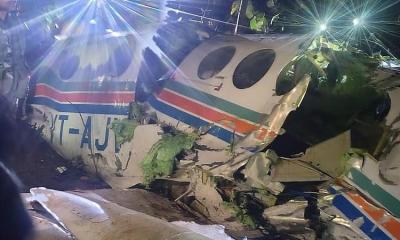Ukrainian President Volodymyr Zelensky urged American lawmakers to do more to protect his country from Russia's invasion in an address before the United States Congress in which he pleaded with President Joe Biden to be the world's "leader of peace."
"Russia has turned the Ukrainian sky into a source of death for thousands of people," Zelensky said in his virtual address before showing a video containing graphic images of death and destruction in Ukraine that ended with "Close the sky over Ukraine."
Zelensky continued his push for the imposition of a no-fly zone over Ukraine and asked for more planes and defence systems to respond to a Russian invasion launched last month that has caused large-scale destruction in his country and has unleashed a wave of refugees.
He closed his address with a direct plea in English to Biden: "I wish you to be the leader of the world. Being the leader of the world means to be the leader of peace."
Along with NATO, Biden and many US lawmakers have resisted a no-fly zone amid concerns that it would escalate the conflict with nuclear-armed Russia. The White House so far also has not supported a proposal to help transfer Russian-made MiG warplanes into Ukraine, though that idea has some support in Congress.
Zelensky's address to lawmakers in Washington came a day after he made a plea to Canada's parliament for more Western sanctions on Russia and the imposition of a no-fly zone over Ukraine.
He received a standing ovation before and after his remarks, with House Speaker Nancy Pelosi introducing him with a chant meaning "glory to Ukraine" in Ukrainian. At the conclusion of his remarks, Zelensky waved over the video feed and put his hand on his chest in thanks for the reception.
Biden on Tuesday signed into law $13.6 billion in emergency aid to Ukraine to help it obtain more weaponry and for humanitarian assistance. Biden was expected to announce an additional $800 million in security assistance to Ukraine later on Wednesday in remarks on US aid to the country, a White House official said.
Zelensky invoked past attacks on the United States - in 1941 by Japanese forces at Hawaii's Pearl Harbor and in 2001 by al Qaeda militants using hijacked airliners - in explaining Ukraine's plight. He also mentioned Mt. Rushmore, the mountainside monument in South Dakota with sculpted faces of four of America's greatest presidents.
"Right now, the destiny of our country is being decided," Zelensky said earlier in the speech through an interpreter, adding that his country was facing a terror that Europe had not experienced since World War Two.
Zelensky also suggested the creation of a new international institution to protect the peace and respond to natural and human-caused disasters.
Russia calls its actions in Ukraine a "special operation."
Zelensky has sought in recent weeks to shore up support for his country in various speeches to foreign audiences, also including the European Parliament and the British Parliament.
Support for Ukraine is a rare instance in which Republicans and Democrats have aligned in a sharply divided Congress, with some lawmakers in both parties urging Biden to go further in helping Ukraine. There is some bipartisan support in Congress for rushing combat aircraft to Ukraine.
On Tuesday, the US Senate unanimously passed a resolution condemning Russian President Vladimir Putin as a war criminal.
The United Nations estimates that around 3 million people have fled Ukraine, mostly women and children, and are seeking safety in neighbouring countries, mainly Poland.
Biden has announced a ban on Russian oil and other energy imports and has called for a suspension of Russia's trading status that affords its exported products lower tariffs in the international arena. The House is attempting to pass legislation responding to Biden's request this week.
It is rare for foreign leaders to address the US Congress during wartime. A famous example came in 1941, when British Prime Minister Winston Churchill spoke to Congress just weeks after Japan's attack on Pearl Harbor that drew the United States into World War Two. Churchill warned that "many disappointments and unpleasant surprises await us."
Following the breakup of the Soviet Union, Russian President Boris Yeltsin in 1992 addressed Congress. Yeltsin's upbeat speech proclaimed: "We have left behind the period when America and Russia looked at each other through gun sights, ready to pull the trigger at any time."
But the sanctions levelled by the United States and its allies against Russia following the invasion and moves to shore up Ukraine's military capability have brought back memories of the decades-long Cold War between the United States and Soviet Union to which Yeltsin had referred.




-20260226080139.webp)



-20260223082704.webp)










-20260225072312.webp)










-20260219054530.webp)
-20260224075258.webp)





-20260221022827.webp)